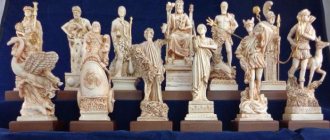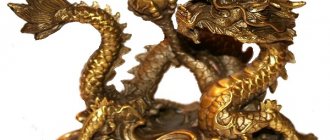Dyy
(Diy, Div) - among the Slavs, the God of Wealth, one of the most ancient Gods. Dyi was not immediately revered as the God of Wealth. Initially, he is known as the God of the Night Sky, created by the Creator Rod himself. However, robbers began to often worship the God of the Night Sky, brought rich sacrifices to him, and Dy began to strive to gain wealth. However, sometimes he is still remembered in the old incarnation of the God of the Night Sky, because for the Gods time moves differently than for people, and the past exists simultaneously with the future.
People's attitudes towards wealth and prosperity
From the very beginning of human development, everyone has strived not only to survive, but also to thrive in all areas of life. In any era, if wealth and material wealth were not valued, then luck, authority and fame among others were valued.
People were afraid that they simply could not achieve success on their own, which is why they turned to deities who brought wealth and prosperity. Many believed in the protection of the gods and prayed to them. They always shared what a person had with the deities, made donations, hoping for mercy and help, which historically came sooner or later. But the gods helped or it was just luck, you and I won’t know.
Legends and descriptions of Western and Eastern gods, responsible for prosperity and good luck, have reached our time.
Slavic gods of wealth
In pagan Rus', the person who had a huge barnyard was considered rich and lucky; in other words, wealth was measured by livestock. To increase their wealth, people prayed to Veles, the god of wealth, popularly called the god of cattle.
Scripture says that it was Veles who set the world in motion. Such concepts as day and night, seasons, bad and good appeared. Veles taught people to appreciate what they have and to achieve more by overcoming difficulties.
To attract good luck from the god of wealth, it was customary for the Slavs to leave donations to him or, one might say, a tribute from everything that was added to their lives. Whether it was a harvest harvested in the fall or a profitable trade deal. Donating what was acquired was considered a guarantee of Veles' patronage in the future.
The Slavs represented the pagan god of wealth according to one source:
- a man dressed in bull's skin;
- a richly dressed old man with a beard made of wheat.
After baptism in Rus', the functions of Veles were transferred by people to St. Nicholas the Wonderworker, whose image to this day is similar to the description in fairy tales and chronicles of the god Veles.
Comedy "Plutos"
The comedy was written and staged by the ancient Greek comedian Aristophanes. In it, the Greek god of wealth Plutos is depicted as a blind old man who is unable to properly distribute wealth. He gives gifts to dishonest and vile people, because of which he himself loses all his wealth.
On his way, Plutos comes across a resident of Athens who restores his sight. The God of Wealth sees again, and this helps him to fairly reward people according to their merits. Plutos becomes rich again and regains the respect of the people.
Greek gods of wealth and prosperity
Wealth and prosperity in Ancient Greece were not held in high esteem by everyone; fame, authority and respect always came first. In Greek mythology, there are cases where a poor peasant and his word had more meaning than the word of a rich aristocrat. A way of thinking that was not associated with achieving wealth led to the scientific and historical discoveries of that time. Some still amaze the minds of humanity.
During the era of economic prosperity in Greece, the first divine patrons appeared. The god of wealth in Greece originates from the goddess Demeter, who patronized agriculture. The baton was subsequently taken over from Demeter by her daughter Persephone (the wife of the god of the underworld), as well as her son Triptolemus, whose mission included teaching people agriculture.
The son of Plutos of the goddess Demeter, who was the fruit of the temptation of the goddess, was described in mythology as blind. It was he who later became the ancient Greek god of wealth and prosperity.
Legend has it that Plutos, due to his blindness, gave gifts to anyone who asked, regardless of appearance or place in society. He received his blindness from the god Jupiter, who cared about all people; it was blindness that made it possible to avoid social injustice. This is how people began to believe that happiness does not choose a person.
It was with the appearance of Plutos in the arena of the gods that the concept of “money” came into everyday use; God taught people to treat money with care and improve their lives according to their wishes. In mythology, Plutos is depicted as a baby holding a cornucopia.
As for luck, it was in charge of the goddess Tychea. She became a deity towards the end of the era. Previously, Tychea was an assistant to the gods.
General information
| Smells | lemon balm, sandalwood, cedar, orange, ylang-ylang, vanilla |
| music | tambourine, sistrum |
| shades | green, yellowish, golden |
| stones | amber, emerald, turquoise, aventurine |
| element | air |
| symbolism | wings, coins, cornucopia, ball, wheel |
| names | Mansense, Mala, Privata, Public, Primigenia |
Roman gods of wealth and prosperity
The Roman Empire is famous for its wealth. The people believed in the protection of the goddess Fortuna, who brought good luck. Initially, the goddess was prayed for fertility and weather, later she was addressed as the goddess of fate. No one knows in advance how fate will turn towards a person.
Fortune is most often depicted as a girl with a blindfold. It is the bandage that symbolizes the fact that the goddess does not evaluate the situation, but simply distributes good luck.
A number of worlds claim that Pluto is the god of wealth in Rome. He was often compared to the Greek Plutos. Pluto in Rome is the god of money and wealth.
Demeter
Demeter is one of the most influential and respected goddesses in Greece. She is the goddess of wealth and fertility. Celebrations and honors were held in her honor throughout Greece, especially during the sowing and harvest months. It is believed that without the help and will of Demeter there will be no harvest: farmers turned to her for help and blessings on their crops, and women asked for fertility and the opportunity to bear a child. An interesting feature is that Homer paid very little attention to this goddess: she almost always remained in the shadow of even less powerful gods. Based on this, we can conclude that in the early years other methods of enrichment prevailed in Greece, and agriculture came to the fore much later, displacing livestock breeding. The location of the goddess promised the farmer favorable weather conditions and a rich harvest.
According to legends, Demeter was the first to plow the earth and sow grains in it. The Greeks who witnessed this were sure that the grains would spoil in the ground, but after some time the harvest sprouted. Demeter taught people to care for crops and grow grain, and later gave them other crops.
Feng Shui
Eastern countries: China, India and Japan - gave the world seven deities who give wealth, abundance and good luck. Today we know how the seven gods of luck and wealth are depicted in the form of small mascot figures.
According to another belief, the monk Tenkoy learned about the seven blessings that identify each deity. Nowadays, talismans are popular, most often made with wood carvings using the netsuke technique.
Daikoku
The god of wealth and prosperity in Japan is Daikoku. The god is depicted in national costume with a mallet in his hands and a bag of rice. Sometimes the god Daikoku is depicted crawling out of a bag or in a bag. He is considered the god who gives wealth.
In Japan, it is believed that the animal rat lives only in rich houses, where there is an abundance of food and supplies.
According to legend, the Daikoku bag contains a lot of rice, coins and jewelry. It is the rat who gnaws the bag while dancing with a mallet, calling luck and wealth into the world, and all the contents pour out of it.
It is recommended to place the talisman in a visible place where it would most often catch the eye. According to legend, it is attention to the talisman that will reward you with prosperity. If you take the palms of Dayokoku and rub it, then wealth and prosperity will come to you.
Fortune
When the Romans conquered Greece, they adopted the goddess Tyche, calling her Fortuna. She is the goddess of luck, happiness, prosperity and success.
According to mythology, Fortune shed her wings when she arrived in Rome and promised to stay there forever. Over time, the cult of Fortune developed rapidly, eclipsing the other gods. She was thanked for sending good luck and even for failures and grief. She was also called the First Born, Happy, Kind and Merciful. All babies and newborns were dedicated to her; her touch determined the future fate of a person.
Later, when moral and ethical foundations began to gradually collapse, the goddess Fortuna became the patroness of the hearth, love and family happiness for both women and men.
Fortune adorned Roman coins and was depicted in art as a woman with a cornucopia on her shoulder, from which wealth poured out - fruits, vegetables and gold. Sometimes she held a chariot in her hands or stood on the bow of a ship. This symbolized the fickleness of fate.
Many Greek gods of wealth and fortune live on in mythology to this day. Is there any truth to this or is a myth always a myth? Everyone has their own opinion on this matter. In any case, it is interesting and educational.
Ebisu
The god of luck and happiness, Ebisu, is the only one of the seven happiness of Japanese origin, considered the god of hard work. According to legend, a boy named Hiruko was born without arms, legs or bones. At the age of one, he was carried away on a boat to the sea, where he had to survive in inhumane conditions. Fate subjected him to terrible trials. He swam for a long time until he washed up on the island. He was saved by a fisherman named Ebisu Saburo, who subsequently raised him as his own son. When the boy was three years old, the gods had mercy on the baby, taking into account all the difficult trials he had passed. So Hiruko’s arms and legs grew, and he became a deity named Ebisu.
God Ebisu is depicted as a cheerful old man with a fish in his hands and a fishing rod or fan. Most often, the gods Ebisu and Daikoku are placed together; according to legend, their strength together is more powerful and will definitely bring happiness.
Bishamon
God Bishamon was borrowed from India, where he was the god of war or in other words, the warrior God who protected and guarded the heavens. In Japan, it is believed that Bishamon brings people wealth and early luck, being officially the god of wealth. In Japan, it is believed that the Warrior God fights on the side of good, destroying evil in the world, giving happiness to everyone who asks.
Most often, Bishamon is depicted in armor and a helmet, holding a weapon in his hands. It is believed that if you keep the Bishamon figurine with you or in a visible place, then financial improvements will come.
Hotei
Hotei is the god of wealth. God Hotei is the god of prosperity, fun and communication. According to legend, he was a wandering monk of Tsitsa who brought fun with him. The monk traveled with a bag, or hotei in Japanese. According to legend, it was from his bag that Hotei extracted everything that people asked for. So Hotei became the god of wealth. It was believed that he had the whole world in his bag. After the monk died, he was considered the eighth reincarnation of Buddha. Hotei is considered the only mortal god from the “seven of fortune.” Hotei is often compared to a laughing Buddha.
God Hotei is depicted with a bag and a coin or piece of gold. His figurine should be placed in a prominent place in your apartment or office, and it will definitely bring wealth.
Tyukhe
In ancient Greek mythology, she is the goddess of luck, happy fate and the patroness of chance. Tyukhe is the daughter of the ocean and Tetia (mother of the gods and patroness of all rivers).
Tyukhe became a cult deity when ordinary people's faith in the gods and their abilities was shaken. The ancient Greeks believed that Tyche accompanies people from birth and throughout their lives. Many cities considered Tyukhe their patroness, her image was minted on coins, and her statues decorated houses.
The goddess was depicted wearing a crown and with the main attributes: a wheel (symbolizing the changeability of luck, hence the expression “wheel of fortune”) and a cornucopia. Tyche often holds in her arms little Plutos, the god of wealth, whom she raised on the island of Crete in secret from his father Zeus.
Fukurokuju
God Fukurokuju is the god of wisdom and longevity, his origin is Chinese. It is Fukurokuju who is the first Chinese god of wealth. According to legend, Fukurokuju influenced the Emperor of China with his wisdom in the matter of recruiting young men from the villages, thereby earning the worship and honor of the Chinese people. Legend also says that Fukurokuju is the incarnation of the North Star of the south. The deity Fukurokuju is not alien to the company of women and the use of alcoholic beverages. Love for human pleasures does not interfere with being a god.
The figurine of God is depicted as an old man with an elongated head; the people associate this feature with wisdom. In the hands of the sage is a scroll where all the wisdom of the world is described and a staff. In Japan there is a legend that if you put a figurine of God under your pillow on New Year's Eve, you will have a prophetic dream. In the morning, the Japanese always write it down on paper and analyze it.
Persephone's companion
The Homeric hymns dedicated to Demeter tell how Persephone played with the infant children of the Titan Ocean, and gathered flowers in a soft meadow: “roses and crocuses, and beautiful violets, and irises, and hyacinths, and daffodils.”
Telling her mother the story of her abduction by Hades, Persephone names her playmates: “We all played in the beautiful meadow: Leucippa and Paino, Electra and Ianthe, Melita and Iache with Rodea and Kallircho, and Melobosis and Tyche, and Okiro, beautiful as a flower, and Chryseus, and Ianeira, and Acaste, and Admete, and Rhodope, and the charming Calypso. Styx was there too, and Urania, and the beautiful Galaxaura with Pallas Athena, who loves battles, and Artemis... We played and collected sweet flowers, soft crocuses mixed with irises and hyacinths, and wonderful lilies and daffodils.”
Pausanias, in his Description of Greece, wrote that Homer was the first to mention Tyche in his hymns. Pausanias writes the following: “Homer did this in a hymn dedicated to Demeter. There he listed all the daughters of Oceanus and told how they played with Persephone, the daughter of Demeter. Among the daughters of this titan, Homer named Tyche.
Jurojin
Jurojin is considered the god of longevity. Jurojin is most often compared to the god Fukurokuju; his appearance, origin, and attributes are the same. Sometimes it is said that two deities live in one body. An old man can be depicted with a staff, sometimes with a musical instrument, the sound of which, according to legend, makes a person look younger, or a turtle, which is a symbol of longevity in Japan. The only difference between the gods is that the shape of their heads is different. God grants not only longevity, but also teaches people honors in old age.
A figurine of the deity Jurojin given as a gift for a birthday prophesies longevity for the birthday person.
Plutocracy
One of the political regimes was named after the god of wealth - plutocracy. The term was introduced at the end of the 19th century and characterizes a form of government in which government decisions are made not by the will of the majority (the people), but by a small group of oligarchic clans located in the shadows. Such a state is ruled primarily by money, and the legitimately elected government is completely subordinate to wealthy clans.
Benzaiten
God Benzaiten is considered the deity of the water element and eloquence. Benzaiten is the only woman in the lucky seven. According to the scripture, she defeated a terrible dragon that devoured children. It was the woman who charmed him with her femininity and eloquence. Benzaiten seduced the dragon and married him, which radically changed the life of her dragon husband. The deity has Indian roots. In India, Benzaiten is considered an image of femininity.
The goddess is most often depicted naked or in beautiful clothes, creating the most sophisticated image possible. In rare cases, the goddess is depicted with a snake or on a dragon. A Benzaiten figurine will bring family well-being to every woman.
Throughout history, many people worshiped the gods and believed in their powerful power. With or without the help of divine power and protection, every person by nature strives to survive, and therefore to thrive. Any person desires more not only in wealth, but also in luck.
How to get in touch with the goddess
To earn the favor of the goddess and resonate with her vibrations, it is necessary to practice mantras using her name.
Lakshmi's main mantra sounds like this:
Another glorifying mantra goes like this:
Both mantras are repeated an odd number of times, a multiple of three - 12, 24, 108. The more repetitions you say, the more closely you will enter the flow of the energy of the goddess.
The attention and favor of the deity can be attracted by placing a figurine in the house or printing an image on a printer. Worshiping the gods always brings them favor.
To successfully practice mantras, you need to combine the repetition of sacred sounds with meditation on the image. To achieve success in life, practice the Gayatri Lakshmi mantra for 36 days, 108 times at sunrise.
The symbols of the goddess that attract her energy are all large flowers, lapis lazuli, yellow or red jade. The metal that expresses Lakshmi's abundance is gold.
You can make an altar to the goddess yourself. To do this, cover the surface with a new cloth with golden threads, place a figurine and symbols - gold jewelry, stones, flowers. You can smoke an aroma with the smell of lotus or other flowers.
At any time, you can turn on a recording of a mantra glorifying Lakshmi and meditate on her image:










